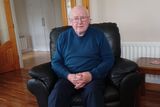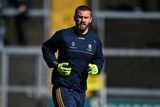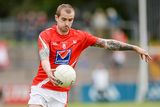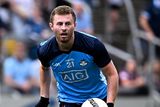Peter Canavan: I played against men who tried to break my leg - you can't stand back and let things happen
All day last Monday, Peter Canavan had been looking forward to watching Mickey Harte appear on Pat Kenny in the Round, Kenny's new series which aired on UTV Ireland for the first time.
Canavan had been interviewed for the show. A number of his neighbours were members of the studio audience for the pre-recorded event in Dublin's Mansion House.
Some of them told Canavan how charged the room was from the power and emotion of Harte's words. Then Canavan sat down in front of his TV on Monday evening and realised he didn't have the channel.
Harte has always had a stimulating creativity, a unique aura. His stoic resolve has been a paragon of bravery and acceptance in the face of such unspeakable tragedy and loss.
Harte's unstinting faith and outlook on life has long been an inspiration to so many, but Canavan didn't need a TV interview to gain an insight into the immense depth of Harte's character, to appreciate the sheer force and strength of his personality. Canavan has been a first-hand witness to Harte's ways and views all of his life.
Read more: Join Independent.ie on summer's exciting road to September
When Harte was at the centre of a split in the Ballygawley club in 1981, a stand-off which saw a number of club players sidelined from football for eight years, many of the meetings to try and resolve the issue were held in Canavan's house, and chaired by Canavan's father.
Canavan was only 10 when first being exposed to the workings and thinking of Harte.
When the row eventually ended, Canavan was, in the words of Harte, "the catalyst" in resolving it. "They (the club) and the county wanted Peter," said Harte to Kenny.
"So, it was good to have him in the official side of things."
From as long as he can remember, Harte was a guiding presence in Canavan's life. "Mickey has always had a very strong faith," he says.
"You always knew when Mickey did something that he would do it right, see it out to the very end, and be successful at it. He was always very easy to listen to. He always had a great use of language."
In 2005, Harte recruited a sports psychologist. After a couple of sessions, Canavan and the players went to Harte and asked to get rid of him.
"It was nothing personal," says Canavan. "We didn't want to listen to the psychologist. We wanted to listen to Mickey. He was the only one who could get inside our heads."
Now, Harte faces possibly his greatest football challenge yet as Tyrone manager. Relegated in the league, a raft of players left the squad in a huff over lack of game-time.
Questioned
Tactically, they have been questioned. On top of all those challenges, Harte recently had a health scare.
"Given what Mickey has been through," says Canavan, "my God if there is any Tyrone blood in these boys at all, they should be doing everything possible to try and give him a lift."
In the same way that Tyrone became such a nemesis for so many counties under Harte, Donegal have become Tyrone's modern tormentor. Tyrone has failed to beat Donegal in the last five seasons. They've suffered three consecutive championship defeats to their neighbours between 2011-'13. When the sides met in a crucial league game in March, Donegal swatted them aside with the back of their hand.
Donegal are favourites again tomorrow, but Canavan sees similarities between the cycle of the current relationship and that of Tyrone-Derry in the early 1990s. Tyrone shipped some hard beatings before something eventually cracked in the 1995 Ulster semi-final.
In a spiteful, frantic match, Tyrone were trailing by three points at half-time, having already had two men sent off. Then Canavan grabbed the game by the throat. He landed 0-8 out of 0-11 to finally break the Derry stranglehold.
"Derry just bullied us and we couldn't get past them," says Canavan. "It came to a point in 1995 where we just decided this couldn't go on any longer. It had to end. It was win at all costs. In recent years, Donegal have bullied Tyrone. There appears to be a level of arrogance from Donegal towards Tyrone that I never saw before. How much of this are Tyrone going to take? Are they finally going to make a stand?"
What does that really mean? Tomorrow's game in Ballybofey has all the potential to start the Championship summer in either a welter of excitement or a fit of rage. Ulster football remains the ultimate GAA marketing paradox.
Honesty and intrigue are the hallmarks of the brand, but its negative image continually makes it as much of a hard sell as an easy one.
In Ulster football's modern history, Canavan was a prime example of its evolution. In the jungle, he was the ultimate species, the main target for predators. To survive and prosper in the jungle, Canavan had to embrace its laws. He had to become as ruthless as the opposition trying to hunt him down.
"If I played to entertain, I would have been very popular with the opposition and everybody else," says Canavan. "And I probably would have finished my career winning nothing."
Canavan's last match for Tyrone was the 2005 All-Ireland final win against Kerry. His final act as an inter-county player was to rugby-tackle Colm Cooper.
"People were right to criticise me because it was cynical," he says. "But I was only doing what had been done to me so many times before. After playing teams like Meath and Dublin, I soon realised that if you stood back and let things happen, you would be walked over.
"Unless you were prepared to do whatever it took to win, you were going to be left behind. If adopting that attitude meant Tyrone winning and me losing some admirers, I make no apologies for it."
For too long now, that has remained the crux at the heart of football. Why should teams abandon cynicism when it is such an asset to winning? Cynicism exists in many forms now, but is the game any more cynical than it was 20 years ago?
"No it's not," says Canavan. "I played against men who tried to break my leg, who tried to break my jaw. That doesn't happen in football now. If I wanted to see fancy-Dan stuff, guys swapping jerseys at half-time, I'd go off and watch another code. Anyone who goes to Ballybofey on Sunday will see over 30 players putting their bodies on the line for 70 minutes.
"That's what makes our game different. I honestly think football is not as bad as people are making out. People are dwelling on the negatives and how poor football could become, but there is an appreciation and awareness now of tactical strategies. A lot of it is fascinating stuff. The quality in a lot of league games was excellent. Some of the U-21 games I saw this year were first-class."
The Tyrone-Tipperary U-21 final two weeks ago was an excellent game.
Incredible
The pace and intensity was incredible for the wet conditions but its quality was overshadowed afterwards by accusations from Tipperary of sledging and cynicism in Tyrone's play.
Tyrone have repeatedly had a bad rap sheet of playing on the absolute edge, but Tipp felt so strongly that they refused to allow the Tyrone management entry into their dressing-room afterwards.
Canavan is Tyrone U-21 coach. "I was very disappointed with the accusation that Tyrone were being coached to be cynical," he says.
"That couldn't have been further from the truth. I was doing the coaching, so I know.
"It is out there that Tyrone coach cynical play from a young age. That is complete nonsense. That is not the way we do things.
"From when I played under Mickey Harte in school and all the way up to Tyrone seniors, he always emphasised the positive, the importance of honing in on the skills.
"People who accused us of being cynical in 2003 and 2005 were wrong. For people who are still accusing us of it now, it is misplaced and misguided."
Twenty years on from first emerging on the national scene, when single-handedly almost leading Tyrone to an All-Ireland senior title, Canavan is still guiding platoons of young footballers. The next wave.
As a player, Canavan abided by one very basic philosophy: the best players always learn to cope and adapt to whatever challenges they're presented with.
Canavan is still learning. He did a stint as Errigal Ciarán manager. He spent a year as Fermanagh manager. He guided Cavan Gaels to last year's county title.
That level of immersion in the game has given him a whole new appreciation of how hard it is to survive and prosper in the modern game.
It has armed him with more insight in his role as a pundit with Sky Sports.
Another All-Ireland success, though, shows that Canavan is still surviving. Still prospering. And still winning.
Read Peter Canavan's column every Saturday at Independent.ie














